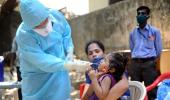Before the novel coronavirus brought its pandemic to New Delhi, Mohammad Aamir Khan was one of tens of thousands of people making a living in the Indian capital as a taxi driver.
But that work dried up during the nearly three-month lockdown to prevent the spread of the virus. With cases rising in India even before the government lifted the lockdown, a friend suggested perhaps the only business now booming in the country -- driving a private ambulance.
All photographs: Danish Siddiqui/Reuters

Meet Mohammad Aamir Khan, an ambulance driver, as he wears his protective face mask as he prepares to leave his house for a mortuary to transport bodies of people who died of the coronavirus disease, for their last rites in New Delhi. On his first day of this new job, the 38-year-old said, he hadn’t even realised he would be transporting coronavirus patients until he was handed a set of overalls.

Khan sprays himself with sanitiser as he prepares to leave his house for a mortuary to transport bodies of people who died of the coronavirus disease. A combination of wearing a mandatory PPE kit while driving an ambulance full of COVID-19 bodies under the oppressive summer heat has made working a massive health challenge for him.

Mohammad Aamir Khan waits for relatives to unload the bodies of people who died of the coronavirus disease for their cremation. Sometimes he is alone in his ambulance and must rely on the relatives of the dead to help him lift the body from the back of the vehicle. Sometimes he has to lift them himself. “It was strange to me, to be carrying a body instead of a patient,” he said of the first time he did it. “But over time, I got used to it.”

Khan changes his personal protective equipment as a woman who died of COVID-19 is cremated. As the job becomes more familiar, Aamir wrestles with how much protective equipment to wear. He could wear a hazmat-like suit, but that isn’t very practical in New Delhi’s ferocious heat.

Khan said that his wife and 7-year-old daughter moved to their maternal grandparents' house about three months ago, and he has not told anyone in his neighbourhood about his current profession, as it might draw unwanted attention in a country where health workers have been targeted by neighbours for fear of spreading the infection.

Ambulance drivers and other vital health workers in India are poorly paid, have minimum training, no health insurance and long working hours. Talking of the hours, the driver says, "We are supposed to work for 12 hours a day – but 12 hours is never 12. Earlier, there used to be one or two bodies. But now the mortuary is full."











 © 2025
© 2025